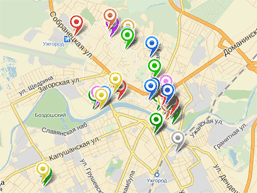Graduates of the Faculty of Humanities and Natural Sciences with the Hungarian language of teaching can easily continue their studies abroad
This modern faculty of UzhNU had laboratories and specialized classrooms equipped in accordance with the latest achievements of science, light, modern lecture rooms and a library looking like the library in a parliament of some European state. The teaching is done by a professional team of lecturers who do not only provide students with high quality knowledge, but also organize students’ leisure activities. This is the Faculty of Humanities and Natural Sciences with the Hungarian language of teaching of UzhNU.
Oleksandr Shpenyk, the Dean of the Faculty, Candidate of Physical and Mathematical Sciences, conducted a tour around the Faculty and told about its history: "The Faculty of Humanities and Natural Sciences with the Hungarian language of teaching was founded in 2008. We run three departments, which train specialists in physics, mathematics, history, Hungarian philology and international relations. 75% of subjects are taught in Hungarian. The goal is to create an opportunity for the representatives of the Hungarian minority of Transcarpathia to obtain a higher education in Ukraine and thus restrain their migration to Hungary. The Faculty can boast with the most technically advanced equipment. Last year a lot of money was invested in its infrastructure and development. In particular, a new library and a fully equipped modern laboratory of natural sciences with 3D-printer and plotters were opened. Modern linguaphone equipment for language study lab was purchased and the reconstruction of the dormitory was completed due to the support of the Hungarian Foundation".
The technical equipment of the Faculty is really impressive: in addition to 3D-printer there is advanced laboratory equipment with the help of which students can investigate physical phenomena in practice.
The ability to speak Hungarian is one of the conditions of joining the faculty. Of course, there are no barriers for those whose native language is different than Hungarian but applicants must understand that most subjects are taught and examinations taken in Hungarian. There were a few students in the history of the Faculty who began their training without having the knowledge of the language: some of them learned it in the first year, and some failed and left the study.
Olexandr Shpenyk says that the Faculty has a network of effective international relations. Of course, the closest ties have been established with the Hungarian universities like the largest in Hungary University of Debrecen and the University of Budapest which is the most famous and the highest rated in Central Europe. "All of our students can undergo study courses at these universities (from 2 to 6 months) and can also study at summer universities to improve their professional level. Uzhhorod National University and the University of Budapest have signed the agreement about the recognition of Bachelor’s diplomas of UzhNU. It opens the opportunity for our students to obtain a diploma of our Hungarian partner. We accordingly recognize the results of studies in Hungary and thus our masters get two diplomas - Ukrainian and Hungarian".
Where can the graduates of the the Faculty of Humanities and Natural Sciences of UzhNU work? The Dean Olexandr Shpenyk explains: "The basic idea of the unit is to train professionals for Transcarpathian schools with the Hungarian language of teaching. In recent years, many teachers left Ukraine for Hungary; therefore there is a good opportunity for our graduates to get a teaching job. Many young people start their teaching career at schools after getting their Bachelor’s diplomas. A lot of successful students enter the post-graduate courses, particularly in Debrecen and Budapest. We are very pleased with this, because it means that our level of teaching meets the requirements of European universities. A lot of students find jobs abroad - not only in Hungary, but also in many other European states including the UK”.
Many graduates of ours work in the field of science. 6 out of 52 last year's graduates of the Faculty entered became post-graduate students, which is a significant percentage. One peson was even employed by a Hungarian school in Brussels.








